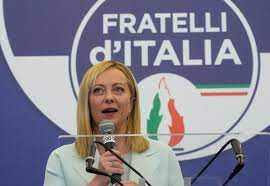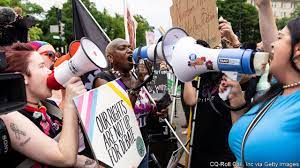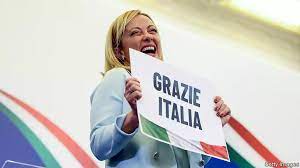A crushing victory for Italy’s nationalist right

Rome: It would be hard to imagine a more satisfying result for Giorgia Meloni and her radical-nationalist Brothers of Italy (fdi) party than the one that took shape early on September 26th after Italy’s general election. With all but 2% of the votes counted, the right-wing alliance to which the Brothers belong trounced its nearest rivals, a centre-left coalition, by more than 18 percentage points.

That, or something very like it, had been foreseen in the polls. What was not fully expected was the extent of the Brothers’ dominance within the stringently conservative partnership now poised to form Italy’s most right-wing government since the second world war. Ms Meloni’s party, which uses as its logo the same symbol as the post-war neo-Fascist party from which the Brothers are descended, took more than 26% of the vote. That compares with 9% for the Northern League (half its share at the last general election, in 2018) and 8% for Forza Italia, whose leader, Silvio Berlusconi, had put himself forward as a moderating influence. In the next government, instead, the prospective role of the 85-year-old Mr Berlusconi and of the League’s Matteo Salvini—should he survive as leader following his party’s dismal result—will be to put up and shut up.

In part, the Brothers’ success is thanks to their novelty. Having taken only 4% in the election in 2018, they were the only major party to stay out of Mario Draghi’s national-unity coalition, which took office last year. As often happens in Italian politics, Ms Meloni’s star is liable to fade once confronted with the dour realities of government. Faced with a probable recession, a war at the borders of the eu and a raging cost-of-living crisis, a government headed by Ms Meloni may have little time or inclination to pursue a radical agenda. Another big question mark hangs over its capacity to deal with such a daunting array of challenges.

Ms Meloni, poised to become Italy’s first female prime minister, referred to both issues in a victory speech to cheering supporters in a hotel in Rome. “The situation of Italy, of the eu, now requires a contribution from everyone,” she said. And she issued a message of reassurance, albeit tinged with vigorous nationalism: “If we are called to govern the nation, we shall do so for everyone: to bring together a people, exalting what unites rather than what divides [and] giving to the Italian people a pride in waving the Tricolore [Italy’s national flag of green, white and red]”. Once a Eurosceptic, Ms Meloni now stresses that she wants to work with Brussels. She is a solid supporter of Ukraine in its conflict with Russia.

A second unexpected aspect of the results was the size of the defeat for the Democratic Party (pd), the biggest force on the left. It won 19% of the vote. That was not much worse, in fact, than its showing at the previous general election in 2018. But it was still a hugely underwhelming performance considering that the campaign became a straight duel between the pd’s leader, Enrico Letta, a former prime minister, and Ms Meloni, who Italian progressives regard with fear and disdain.
Congratulations poured in from the kind of politicians who horrify those in Brussels, Paris and Berlin who aspire to a more united Europe. First off the mark was Balazs Orban, the political adviser to Hungary’s prime minister, Viktor Orban (no relation). “In these difficult times, we need more than ever friends who share a common vision and approach to Europe’s challenges,” he tweeted. Mateusz Morawiecki, Poland’s prime minister, issued his congratulations shortly afterwards. Marine Le Pen of France’s National Rally said Italians had “decided to take their destiny into their own hands by electing a patriotic, sovereignist government”.
Aside from Ms Meloni, the main winner was populism—as it was in the 2018 election. The increasingly left-leaning Five Star Movement (m5s) did significantly better than the polls had predicted, taking more than 15% (though that compared with almost one-third of the vote in 2018.) Giuseppe Conte, the Five Stars’ leader and another former prime minister, appeared to have teased out of abstention a significant number of voters in Italy’s poorer south. The right is united in wanting changes to the “citizens’ income” benefit, a Five Stars’ innovation from 2019 intended to provide a safety net for the hard-up.
Several prominent figures, including Luigi Di Maio, the foreign minister in Mr Draghi’s outgoing government, lost their place in the legislature. And in the settling of accounts that is bound to follow Mr Letta, like Mr Salvini, looks ripe for the chop.
How the votes will translate into seats in Italy’s new, smaller parliament is still being calculated. But an unofficial projection for rai, Italy’s national broadcaster, gave the right-wing coalition outright majorities of between 32 and 52 seats in the 400-member lower house, the Chamber of Deputies, and of 14 to 26 seats in the 200-strong Senate. With such a yawning gap between the probable next government and opposition, a centrist alliance led by a former pd minister, Carlo Calenda, was in no position to reach its objective of holding the balance of power.
The new government is not expected to take office until the end of October. The allocation of ministries will be hammered out in the meantime. The formal choice of prime minister will be made by the president, Sergio Mattarella. He will now embark on a round of consultations with delegations from the various parties. But it is hard to see how anyone other than Ms Meloni will get the nod.





